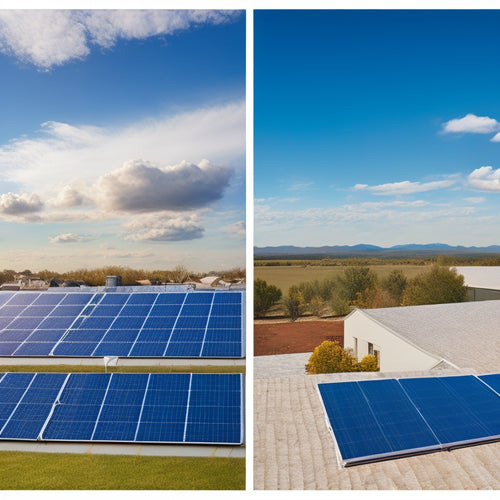
Best Panels for Charging Electric Vehicles at Home
Share
You're searching for the best solar panels to charge your electric vehicle at home, and maximizing energy output and savings is your top priority. Top brands like Tesla, Panasonic, and SunPower offer high-efficiency panels with exceptional warranties and customer service. When selecting a panel, consider power output, safety certifications, and smart charging features. You'll also want to think about panel size, design, and installation type, as well as budget-friendly options like affordable Level 2 charging stations and time-of-use pricing plans. From here, you can explore further to find the perfect balance of performance, efficiency, and cost savings for your EV charging needs.
Key Takeaways
• Choose high-efficiency solar panels from reputable brands like Tesla, Panasonic, or SunPower for optimal energy output.
• Consider the power output and voltage range of the solar panel to ensure compatibility with your EV charging needs.
• Ensure the solar panel is certified for safety and performance, and look for features like smart charging and real-time energy tracking.
• Aesthetically pleasing and space-efficient designs are important, but prioritize energy output per hour of sunlight and durability.
• Consider budget-friendly options like community solar programs and cost-saving strategies to maximize energy output and savings.
Top Solar Panel Brands Compared
When selecting solar panels for charging your electric vehicle at home, you're likely to come across several top brands, each boasting unique features and benefits that set them apart from the competition. As you navigate the market, you'll notice that some brands stand out for their exceptional brand reputation, built over years of delivering high-quality products and excellent customer service.
Industry trends also play a significant role in shaping the solar panel market, with leading brands often at the forefront of innovation.
Top brands like Tesla, Panasonic, and SunPower are well-known for their high-efficiency solar panels, designed to maximize energy output and minimize environmental impact. Other brands, such as LG and Hanwha Q CELLS, offer high-performance panels with advanced features like bifacial technology and enhanced durability.
When evaluating these brands, consider factors like warranty periods, certifications, and customer reviews to make certain you're investing in a reliable and efficient solar panel system for charging your electric vehicle.
Charging Speed and Efficiency Matters
When you're charging your electric vehicle at home, you want to make the most of your time and energy. That's why charging speed and efficiency matter - you need a system that can deliver a full charge quickly and without wasting energy.
Time-Saving Charge Cycles
Improving your charging routine with time-saving charge cycles can greatly reduce the time spent waiting for your electric vehicle to recharge, allowing you to get back on the road faster. With smart charging, you can optimize your charging schedule to coincide with off-peak hours, reducing strain on the grid and saving you money. Rapid fueling capabilities can also substantially cut down on charging time, making it ideal for those with busy schedules.
Here's a comparison of different charging methods:
| Charging Method | Charging Time | Cost Savings |
|---|---|---|
| Level 1 (120V) | 24 hours | 0% |
| Level 2 (240V) | 4-8 hours | 20% |
| DC Fast Charging | 30 minutes | 50% |
Efficient Energy Transfer
By optimizing the charging speed and efficiency of your electric vehicle's charging system, you can greatly reduce the time spent waiting for a full battery, making EV ownership more convenient and practical for daily use.
As an EV owner, you understand the importance of efficient energy transfer. With the integration of smart grids and energy harvesting technologies, you can maximize your charging speed while minimizing energy waste.
By leveraging these advanced technologies, you can substantially reduce your charging time, allowing you to get back on the road faster. Additionally, efficient energy transfer also means reducing your carbon footprint, making your EV ownership more environmentally friendly.
By choosing the right charging panel for your home, you can ensure a seamless and efficient charging experience that aligns with your eco-friendly values.
With efficient energy transfer, you'll be able to enjoy the convenience of EV ownership while contributing to a more sustainable future.
Optimized Power Flow
As you optimize your charging system, you'll want to focus on achieving optimized power flow, which directly impacts your vehicle's charging speed and efficiency. This is vital, as it determines how quickly your electric vehicle (EV) can recharge.
Optimized power flow guarantees that your EV receives the necessary power to recharge efficiently, reducing charging times and minimizing energy waste. To achieve this, you'll want to integrate your charging system with a Smart Grid, which enables real-time monitoring and management of energy distribution. This allows for efficient energy allocation, reducing strain on the grid and optimizing power flow.
Moreover, incorporating Energy Harvesting technologies, such as solar or wind power, can supplement your energy needs, reducing your reliance on the grid and further optimizing power flow. By prioritizing optimized power flow, you'll be able to charge your EV quickly, efficiently, and sustainably, making the most of your investment in electric vehicle technology.
Key Features to Look for Online
When shopping for an EV charging panel online, you'll want to take into account several key features to make sure you find the right one for your needs.
You'll need to think about power output options, as some panels can deliver more energy than others, affecting how quickly your vehicle charges.
Additionally, you'll want to look for charging speed variations and safety certification standards to guarantee a safe and efficient charging experience.
Power Output Options
You'll need to take into account the power output options of a home electric vehicle (EV) charging panel, as they directly impact the speed at which your vehicle recharges. The power output options you choose will depend on your specific needs and the capabilities of your vehicle.
When shopping for a charging panel, consider the voltage range it can accommodate. A wider voltage range provides more flexibility with regards to the types of vehicles it can charge. Look for a panel that can handle a range of 208-240 volts, which is compatible with most EVs.
Output flexibility is also important, as it allows you to adjust the power output to match your vehicle's capabilities. A panel with adjustable power output ensures you can optimize the charging speed for your specific vehicle. This feature is particularly valuable if you plan to upgrade to a new EV in the future.
Charging Speed Variations
Your electric vehicle's charging speed will depend on the charging panel's power output, and understanding the variations in charging speeds is important to finding the right panel for your needs. Charging speeds can vary greatly, and it's vital to take into account factors that affect charging time.
Here are some key considerations:
-
Voltage fluctuations: Make sure your charging panel can handle voltage fluctuations in your home's electrical grid, which can impact charging speed and battery health.
-
Charging modes: Look for panels that support multiple charging modes, such as Level 1 (120V), Level 2 (240V), and DC Fast Charging.
-
Amps and watts: Higher amps and watts translate to faster charging speeds, but be mindful of your vehicle's maximum charging capacity.
-
Onboard charger: Check if your vehicle has an onboard charger, which can limit charging speed.
-
Smart charging features: Some panels offer smart charging features that optimize charging speed based on your schedule, energy usage, and other factors.
Safety Certification Standards
As you shop for a charging panel online, make sure to look for safety certifications from reputable organizations, such as UL (Underwriters Laboratories) or ETL (Intertek), which guarantee the product meets rigorous safety standards.
These certifications guarantee the panel has undergone rigorous testing and meets regulatory compliance requirements. A UL Certification, for instance, verifies that the product has met the safety standards set by the organization, providing you with peace of mind.
When browsing online, look for the UL or ETL mark on the product page or manufacturer's website. This mark indicates that the product has been tested and certified to meet specific safety standards.
Regulatory compliance is essential when it comes to charging your electric vehicle at home, as it ensures the safety of your vehicle, your home, and yourself. By choosing a certified product, you can be confident that you're investing in a safe and reliable charging solution.
Solar Panel Size and Design Options
When selecting solar panels for charging electric vehicles at home, choosing the right panel size and design is crucial to guarantee efficient energy harvesting and seamless integration with your EV's charging system. You want to make certain that your solar panels aren't only functional but also visually appealing and space-efficient.
Here are some key considerations for solar panel size and design:
-
Aesthetically Pleasing: Look for panels with sleek, modern designs that blend seamlessly into your home's architecture. You'll want to select a panel that complements your home's style, whether it's modern, traditional, or anything in between.
-
Space Efficiency: Consider the size of your roof or available space when selecting panel size. Larger panels may be more efficient, but they may not fit your available space. Look for panels that offer high energy output in a compact design.
-
Energy Output: Choose panels with high energy output per hour of sunlight to maximize your energy harvesting potential.
-
Durability: Select panels built to withstand harsh weather conditions and last for years to come.
-
Brand Reputation: Research reputable brands known for producing high-quality, durable solar panels that meet your energy needs.
Installation and Mounting Essentials
Proper installation and mounting of your solar panels are essential to guaranteeing peak energy harvesting, safety, and longevity of the system. When it comes to mounting, you'll need to decide on the type that suits your setup.
You can opt for a roof-mounted system, which is the most common, or a ground-mounted system, ideal for larger properties. Additionally, you may consider a tracking system that adjusts to the sun's position for maximum energy output.
When it comes to wiring, you'll need to make sure that your electrical connections are secure and meet local building codes. You should also consider the gauge and type of wire, as well as the connections between panels and the inverter.
Wiring considerations include ensuring that your system can handle the electrical load, and that you've accounted for voltage drop and overheating risks. By getting the installation and mounting right, you'll be able to enjoy a reliable and efficient solar panel system that powers your electric vehicle with clean energy.
Budget-Friendly Options for EV Owners
You can greatly reduce the cost of charging your electric vehicle at home by exploring budget-friendly options that won't compromise on performance. As an EV owner, you're likely eligible for various EV incentives, which can considerably offset the upfront cost of home charging equipment. Take advantage of federal and state tax credits, rebates, and other incentives to minimize your expenses.
Here are some budget-friendly options to explore:
-
Look for affordable Level 2 charging stations that can be installed in your garage or outdoors
-
Contemplate a plug-in hybrid or used EV, which can be more affordable than purchasing a brand-new EV
-
Opt for a time-of-use (TOU) pricing plan, which can lower your charging costs during off-peak hours
-
Invest in home upgrades, such as a 240-volt charging station, to future-proof your home for EV ownership
-
Explore community solar programs or shared EV charging stations in your neighborhood
Maximizing Energy Output and Savings
By optimizing your home's electrical infrastructure and charging habits, you can maximize your energy output and savings, ensuring a cost-effective and efficient EV ownership experience. As an EV owner, you want to make the most of your investment, and smart home technology can help you achieve that. By integrating energy monitoring systems into your smart home, you can track your energy consumption and identify areas for improvement.
| Energy Monitoring Features | Benefits | Smart Home Integration |
|---|---|---|
| Real-time energy tracking | Identify energy-hungry appliances | Integrates with smart plugs and outlets |
| Energy usage forecasting | Plan your energy consumption | Compatible with smart thermostats |
| Personalized energy reports | Optimize your energy usage | Works with smart home automation systems |
Frequently Asked Questions
Can I Install an EV Charging Panel Myself, or Do I Need a Pro?
'If you're considering DIY EV charging panel installation, be aware of the DIY risks, including electrical shock and improper wiring. It's advisable to hire a licensed electrician with EV charging qualifications to guarantee a safe and efficient installation.'
Are There Any Incentives for Installing EV Charging Panels at Home?
You're eligible for Federal Rebates and State Credits when installing EV charging panels at home, which can greatly offset your investment, making the shift to eco-friendly driving more affordable and attractive.
Can I Use a Single Panel to Charge Multiple Electric Vehicles?
"Ha! You think one panel can handle all your EVs? Think again! In multi-car households, load management is key. You'll need vehicle prioritization, charger sharing, and a deep understanding of your household dynamics to make it work."
How Long Does It Take to Fully Charge an EV Using a Home Panel?
When you charge your EV at home, the time it takes to fully charge depends on your vehicle's battery capacity and the charging speed of your panel - typically ranging from 4-12 hours.
Do EV Charging Panels Work During Power Outages or Grid Failures?
When the grid goes down, you're not stuck; many EV charging panels come equipped with backup systems, ensuring you can still charge your vehicle during power outages, thanks to their grid reliability features.
Related Posts
-

Why Go Green With Automotive Products Online?
By switching to eco-friendly automotive products online, you're taking a significant step towards reducing your carbo...
-

Why Cities Need Smart Charging Infrastructure Now
You're about to experience a tidal wave of electric vehicles hitting your city's streets, and it's essential you're p...
-

Tracking Solar Panels Vs Fixed Panels Cost Savings
When considering solar panel options, you'll want to weigh the cost savings of tracking solar panels versus fixed pan...


